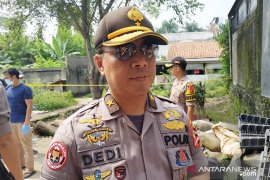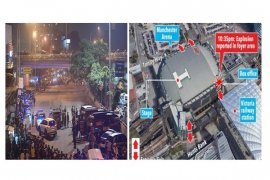The National Police's Densus 88 counterterrorism squad arrested on Saturday two men and a woman in Bekasi, West Java. The police's initial investigation has found that the bomb was to have been detonated by DYN on Sunday morning during the Presidential Security Detail's (Paspampres) handover ceremony at the palace
The first two suspects, identified only as NS and AS, were arrested at around 3:40 p.m. on Saturday on the Kalimalang overpass, while the other suspect, a 27-year-old woman identified only as DYN, was arrested 10 minutes later in a rented house in Bintara Jaya subdistrict. In the house, the police found a high-explosive bomb weighing around 3 kilograms packed into a pressure cooker.
Bahrum Naim's link
The police say the bomb prepared in a plot to attack the State Palace in Central Jakarta contained high explosives, designed to create mass destruction and a large number of casualties. The bomb, found on Saturday at a rented house in the neighboring region of Bekasi, West Java, weighed around 3 kilograms and was made of triacetone triperoxide (TATP), a highly explosive substance used in many terrorist attacks.
TATP, also known as the "Mother of Satan", was the primary explosive material used in the bombs and suicide vests in the November 2015 Paris terrorist attacks. The unstable chemical was also used in the 2005 London bombings.
The police say that a group of people arrested in Bekasi, West Java, for allegedly plotting a bomb attack on the State Palace is part of a terrorist network controlled by a terrorist convict who allegedly masterminded a deadly terrorist attack in Central Jakarta earlier this year. The police had uncovered links between the three people who were arrested on Saturday and Muhammad Bahrun Naim Anggih Tamtomo, aka Bahrun Naim, a leader of the Katibah Nusantara militant group, a regional affiliate of the Islamic State (IS) movement.
In Southeast Asia, there is a figure named Bahrun Naim who established [radical group] Katibah Nusantara. He wants to become the leader of the Southeast Asian IS branch several figures in Asia are competing against each other for the position,'he said, adding that Thursday's attacks were conducted to prove to the IS international leadership that he was worthy of the position.
Bahrun Naim is no stranger to the police force. In November 2010, the National Police's counterterrorism squad Densus 88 arrested him and confiscated hundreds of bullets from his house in Pasar Kliwon, Surakarta, Central Java. The Surakarta District Court sentenced him in June 2011 to two-and-a-half years in prison for violating Emergency Law No. 12/1951 on illegal firearms possession. The police suspect that after his release from prison, Bahrun traveled to Syria to join IS earlier last year. He was back in the spotlight following the disappearance of Muhammadiyah Surakarta University (UMS) student Siri Lestari, who was alleged to have wed Bahrun Naim in 2014.
Bahrun Naim himself is well known to the police. In November 2010, Densus 88 arrested him and seized hundreds of rounds of ammunition from his house in Surakarta, Central Java. The Surakarta District Court sentenced him in June 2011 to two-and-a-half years in prison for violating Emergency Law No. 12/1951 on illegal firearms possession. Bahrun is believed currently to be in Raqqa, Syria, the de facto capital of IS.
Although his whereabouts remain unknown, Bahrun's crucial role in leading Indonesian terrorist cells became public after the police identified him as the mastermind behind a terrorist attack on Jl. MH Thamrin, Central Jakarta, on Jan. 14, which led to the deaths of four terrorists and four civilians.
What Must We Do ?
According a report published by the British-based news publication, the Independent, one of IS' propaganda agencies, Aamaaq news agency, claimed on its Telegram channel that IS fighters had carried out an armed attack 'targeting foreign nationals and the security forces charged with protecting them in the Indonesian capital'.
According to The Jakarta Post, major terrorist attacks in Indonesia such as Aug. 1, 2000. Residence of the Philippine ambassador in Jakarta. Two civilians killed and the Philippine ambassador injured. Sept. 13, 2000. Jakarta Stock Exchange. 15 killed and dozens wounded. Dec. 24, 2000. Series of Christmas Eve blasts rock churches in Jakarta. 17 killed, 100 wounded. Oct. 12, 2002. Bali bombing. 202 killed, hundreds wounded. Aug. 5, 2003. JW Marriott Hotel. 12 killed, 150 wounded. Sept. 9, 2004. Australian embassy bombing. 10 killed, more than 100 wounded. May 28, 2005. Tentena market bombing in Central Sulawesi. 22 killed. Oct. 1, 2005. Bali bombing. 23 killed, dozens wounded. July 17, 2009. JW Marriott and Ritz-Carlton. 9 killed and more than 50 injured.
Meanwhile, Nasir Abas, a terrorism expert from the University of Indonesia, said he was convinced that terrorists were directly affiliated with and fully funded by IS. He said the aim of the attacks was to announce their existence in the country. In previous bombings, he said, terrorists targeted Westerners and only aimed to express their hate for the West and its ideologies. "The attacks were also more brutal as they involved multiple perpetrators and shooting in addition to the suicide bombs," Nasir further explain.
Whilst, terrorism expert Al Chaidar said the terrorists were not directly affiliated with IS and did not act on behalf of the main group in Syria. "They looked like only a small group of supporters who wanted to try a similar attack to the one in Paris, 'Chaidar said, adding that the reason behind the attacks might be revenge for the 2010 arrest of terrorist convict Abu Bakar Ba'asyir and the arrests of several other radical group members.
However, a terrorist threats is still haunt our national security, and its could be endangering human security in Indonesia. In this context, we must do a special tactics and strategies to counter and to minimalize a terror threats in Indonesia through tighting our security neighborhood environment, an intelligence communities must have a "planted agent" in a terror group or their cells because only through this way, we can know a terror attacks plan early.
Besides that, the goverment must be made a firmly regulation or firmly treatment to ban or closing some of radical groups which it was spreading and maintaning with a terror groups link. These strategies must be done because a radical groups existance could be dangered our national harmonization, its could be a way by terror groups to recruit a new member, a radical groups has broken national cohesion and last but not least a radical groups has always been threatening our tenet.
*) The writer is a former mass communication director at LSISI, Jakarta.
Terrorist Threats Still Haunt Our National Security, What Must We Do?
Kamis, 15 Desember 2016 20:29 WIB

Otjih Sewandarijatun. (ANTARA FOTO/Ist/Dokumentasi Pribadi/Dok).
The goverment must be made a firmly regulation or firmly treatment to ban or closing some of radical groups.









